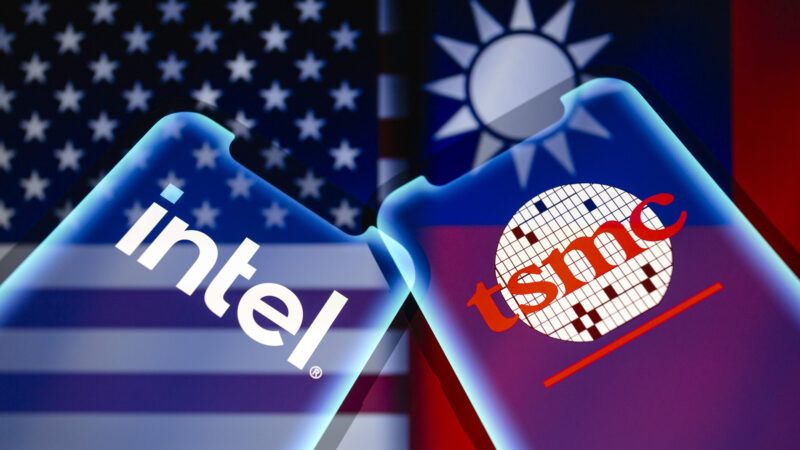TSMC May Acquire Fellow CHIPS Act Beneficiary Intel
Collectively, the two companies were promised more than $14 billion in government grants. Now, one is failing and may be partially acquired by the other.

The Wall Street Journal reports that two semiconductor chip makers—Taiwan Semiconductor Manufacturing Co. (TSMC) and Broadcom—are each weighing the possibility of buying part of Intel, another competitor in the space. Both Intel and the Trump administration are apparently interested in making a deal. But depending on what happens, it could be an example of one recipient of corporate welfare acquiring another.
Intel was once a dominant force in personal computing—perhaps the dominant force, designing and building the majority of all microprocessors used in both personal and commercial applications. But its fortunes have shifted since the early 2000s, owing to increased competition and its ill-fated decision not to take Apple's 2007 offer to supply chips for the first iPhone.
Intel's stock lost over 60 percent of its value in 2024, making it the year's worst performer on the entire Nasdaq composite index, as competitors Nvidia and AMD soared. In November, the Dow Jones Industrial Average replaced Intel on its index with Nvidia, which Dow Jones officials felt was "more representative" of "the semiconductors industry."
The deals that Broadcom and TSMC are apparently exploring would split Intel in two: Broadcom wants to take over Intel's design and marketing, while TSMC, separately, is eyeing its manufacturing facilities. (Broadcom "would likely only do so if it finds a partner for Intel's manufacturing business," the Journal noted, while TSMC's bid would leave the design side alone.)
"The Trump administration has encouraged TSMC to do the deal," The New York Times reported last week. "Howard Lutnick, President Trump's nominee for commerce secretary, has been involved in the conversations and considers them one of the most consequential challenges of his new job." (The Senate confirmed Lutnick to that position this week.)
The Journal separately confirmed the Trump administration's push for a TSMC deal but added, "A White House official said the president was unlikely to support a deal that involved a foreign entity operating Intel's factories."
The CHIPS and Science Act, passed during Joe Biden's presidency, apportioned $39 billion in direct incentives for semiconductor manufacturing. On its way out the door, the Biden administration authorized numerous CHIPS Act grants, including $7.865 billion for Intel on promises that the company would spend tens of billions of dollars by the end of the decade building or expanding factories in four states.
Officials initially approved a grant for $8.5 billion but later trimmed the amount over fears about the company's viability: Intel had already scaled back the scope of its current projects, and as The New York Times reported, "it has struggled to convince customers that it can match TSMC's technology."
Intel lost $16.6 billion in the third quarter of 2024—the biggest loss in its history—and it would lose another $126 million the following quarter. (Intel stock rose 10 percent this week amid news of an impending acquisition.)
Notably, as a condition of the CHIPS Act grant, "Intel was required to maintain a majority share of its factories if they were spun off into a new entity," the Journal reports—meaning an acquisition could void that deal.
But if TSMC acquired Intel's manufacturing facilities, the taxpayer won't be off the hook, because that company also benefited from a generous CHIPS Act grant.
"Today, the Biden-Harris Administration announced…up to $6.6 billion in direct funding" and "up to $5 billion of proposed loans" to TSMC for its planned construction of three semiconductor fabrication facilities in Arizona, according to a November 2024 press release from the Department of Commerce.
As of this writing, TSMC has a market capitalization exceeding $1 trillion; $6.6 billion in free government money is likely a nice perk, but the company could certainly afford to build the factories without it.
In fairness, Broadcom—Intel's other potential bidder—has received its share of corporate welfare, though none from the CHIPS Act.
There is plenty of upside if TSMC acquires Intel's manufacturing facilities: The company currently produces more than 90 percent of the world's most advanced semiconductors, and as recently as 2023, all production took place in Taiwan. With that nation under increasing threat from China, expanding to the United States would help secure the supply chain, benefiting both the business and its customers.
But TSMC has more than enough cash to do that on its own. Further, an acquisition would suggest that Intel was not a worthwhile recipient of billions of taxpayer dollars. The companies should make their own business decisions and leave the taxpayers out of it.


Show Comments (6)